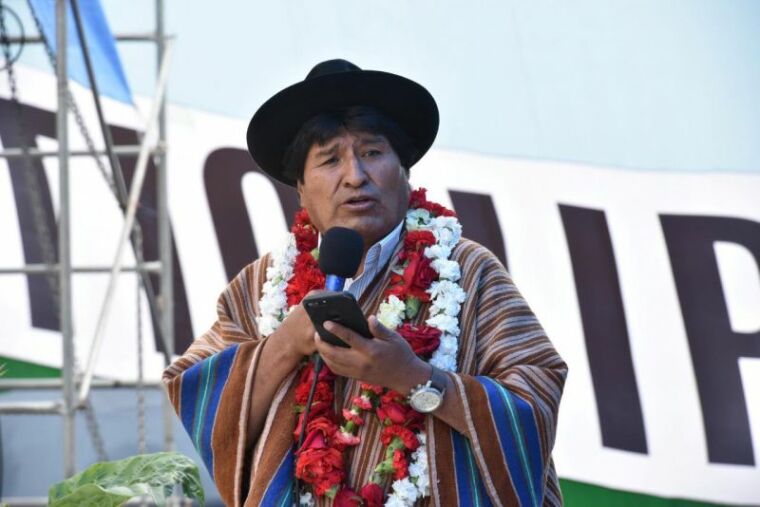Bolivia's President scraps penal code that criminalized evangelistic activities

Bolivian President Evo Morales has announced that his government has decided to revoke the penal code that would have imposed restrictions on evangelistic activities.
The penal code, which was approved on Dec. 15, had caused great concern among evangelical organization who believed that the wording of Article 88 criminalizes evangelism alongside terrorism.
The article in question stated that "whoever recruits, transports, deprives of freedom, or hosts people with the aim of recruiting them to take part in armed conflicts or religious or worship organizations will be penalized 5 to 12 years of imprisonment."
On Sunday, evangelical leaders held a national day of prayer and fasting to express their opposition to the law. That same day, the president announced that he will ask the Legislative Assembly to repeal the law following recent changes that included severe restrictions on religious freedom.
"We have decided to repeal the Criminal Code to avoid confusion and so the Right stops conspiring and doesn't have arguments to generate destabilization in the country, with disinformation and lies," the president tweeted, as translated by Christianity Today.
"We are going to listen to the proposals of all the sectors that observe the code. The National Government will never approve norms against the Bolivian people," he added.
Morales confirmed the announcement on state television, saying he does not want to keep using the penal code put in place by former dictator and president Hugo Banzer.
"I ask the assembly ... to rapidly advance a new code. I'm almost positive there will be a few changes and modifications to the articles," he declared.
The president contended that the new penal code was a copy of the Codes of Europe and United States.
The amendments to the code included the expansion of punishments for "recklessness, negligence, malpractice" in all careers, which prompted concerns from professionals such as doctors and journalists.
In one of his tweets, Morales lashed out at critics who denounced the law's crackdown on freedom of expression.
He pointed out that 1,050 new media companies and 4,833 new unions have been registered during his administration.
Several Christian groups spoke out against the amendments, including the Inter-American Federation of Christian Lawyers (FIAJC), which visited Bolivian embassies in several Latin American countries to deliver a public notice warning against the dangers of the new penal code to religious freedom.
The Religious Liberty Commission of the World Evangelical Alliance had issued a prayer alert asking its followers to pray that Morales' government would repeal the penal code provision and "protect and promote religious freedoms in Bolivia."
In addition, the National Association of Evangelicals in Bolivia (ANDEB) issued a public declaration saying the new code was "badly written," adding that its punitive power amounts to "state abuse."
 Christians don't have to affirm transgenderism, but they can’t express that view at work: tribunal
Christians don't have to affirm transgenderism, but they can’t express that view at work: tribunal Archaeology discovery: Medieval Christian prayer beads found on Holy Island
Archaeology discovery: Medieval Christian prayer beads found on Holy Island Presbyterian Church in America votes to leave National Association of Evangelicals
Presbyterian Church in America votes to leave National Association of Evangelicals Over 50 killed in 'vile and satanic' attack at Nigerian church on Pentecost Sunday
Over 50 killed in 'vile and satanic' attack at Nigerian church on Pentecost Sunday Ukrainian Orthodox Church severs ties with Moscow over Patriarch Kirill's support for Putin's war
Ukrainian Orthodox Church severs ties with Moscow over Patriarch Kirill's support for Putin's war Islamic State kills 20 Nigerian Christians as revenge for US airstrike
Islamic State kills 20 Nigerian Christians as revenge for US airstrike Man who served 33 years in prison for murder leads inmates to Christ
Man who served 33 years in prison for murder leads inmates to Christ


 Nigerian student beaten to death, body burned over ‘blasphemous’ WhatsApp message
Nigerian student beaten to death, body burned over ‘blasphemous’ WhatsApp message 'A new low': World reacts after Hong Kong arrests 90-year-old Cardinal Joseph Zen
'A new low': World reacts after Hong Kong arrests 90-year-old Cardinal Joseph Zen Iran sentences Christian man to 10 years in prison for hosting house church worship gathering
Iran sentences Christian man to 10 years in prison for hosting house church worship gathering French Guyana: Pastor shot dead, church set on fire after meeting delegation of Evangelicals
French Guyana: Pastor shot dead, church set on fire after meeting delegation of Evangelicals ‘Talking Jesus’ report finds only 6% of UK adults identify as practicing Christians
‘Talking Jesus’ report finds only 6% of UK adults identify as practicing Christians Mission Eurasia ministry center blown up in Ukraine, hundreds of Bibles destroyed: 'God will provide'
Mission Eurasia ministry center blown up in Ukraine, hundreds of Bibles destroyed: 'God will provide' Church holds service for first time after ISIS desecrated it 8 years ago
Church holds service for first time after ISIS desecrated it 8 years ago Burger King apologizes for 'offensive campaign' using Jesus' words at the Last Supper
Burger King apologizes for 'offensive campaign' using Jesus' words at the Last Supper Uganda: Muslims abduct teacher, burn him inside mosque for praying in Christ’s name
Uganda: Muslims abduct teacher, burn him inside mosque for praying in Christ’s name